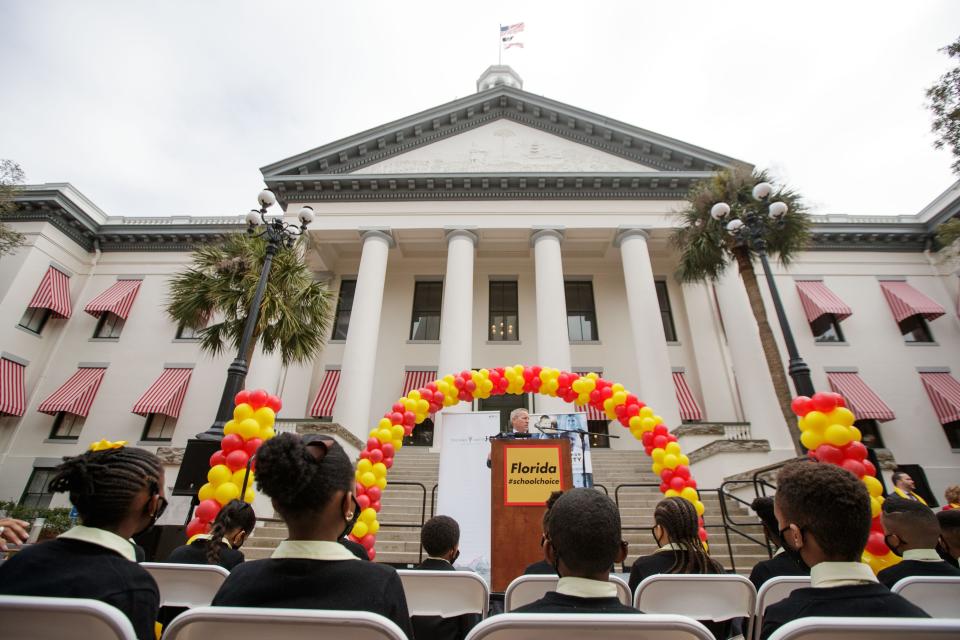School vouchers let parents customize children’s education
It’s fitting that a recent op-ed column would characterize supporters of education choice as monsters. That’s what you do when you’re trying to scare people.
Instead of demonizing politicians and nonprofits, the author should talk to parents like me, whose families benefit from being able to create learning environments that meet our children’s individual needs.

Homeschooling offers us the opportunity to tailor education to our children’s learning styles while integrating family and individual needs. Florida’s Personalized Education Program (PEP) and the Family Empowerment Scholarship for Students with Unique Abilities (FES-UA) provide families access to educational resources that enhance this experience.
As a homeschooled student in the 1980s and ‘90s, I experienced the stigma of homeschooling during a time when it was often ridiculed. Since then, I’ve witnessed the shift in public perception, the dramatic growth, and the demographic expansion of home education. It has burgeoned into a culturally, racially, and economically diverse movement with varied philosophies and worldviews.
As a second generation homeschool family, my husband and I have educated our four children at home since kindergarten. The launch this past school year of the new PEP scholarship, which averages about $7,800 per student for 2024-25, has helped relieve the financial pressure homeschool families face.
How do we spend PEP funds? First and foremost, we buy textbooks and school supplies to ensure that each child receives a well-rounded education tailored to their specific interests and abilities, by including music, sports, religion, and educational summer camp activities. Since our kids are serious readers, we use some of the money to buy children’s books, especially those not available through our public library system. We treat our collection as a lending library, so other families can benefit as well. We use PEP funds for an audiobook subscription so that our dyslexic child can access great literature, too.
PEP also enables our children to take advantage of more online classes than we could afford previously. For example, this summer our daughter, who loves Shakespeare, is taking a live online class on “The Merchant of Venice” with a Shakespearean author. Our daughters are also taking honors math courses paid for by PEP funds through Florida Virtual School.
We use PEP support our children’s musical gifts, paying for lessons in piano and strings, as well as membership fees for the Tallahassee Youth Orchestra and Tallahassee Homeschool String Orchestra. These resources are often readily available to public school students, yet we—as homeschool families—have been paying out of pocket before now.
Rather than simply consume public resources, we intentionally find ways to give back to the community we love. For example, our children share their talents with the community by performing in volunteer concerts at venues such as Maclay Gardens State Park and Mission San Luis Museum, at church, and in local assisted-living communities.
More: Stop bleeding our public schools of dollars, growth opportunities
Unlike public parks and libraries, not all schools are open to everyone. Attendance is assigned according to ZIP code, or, in the case of magnets, enrollment is limited by lottery or even restricted by testing or auditions.
Public schools can still play a role, thanks to PEP. Scholarship funds can be used for district school courses and services, and the districts collect the funds. That’s the kind of collaboration that can expand education opportunities for all.
Home education may not be possible for every family, but the PEP program is making this choice more accessible than ever for students of all backgrounds who would benefit from personalized education.

Emily Moriarty Lemmon is an evolutionary biology professor at Florida State University, wife, and mother of four homeschooled children spanning kindergarten to ninth grade.
JOIN THE CONVERSATION
Send letters to the editor (up to 200 words) or Your Turn columns (about 500 words) to [email protected]. Please include your address for verification purposes only, and if you send a Your Turn, also include a photo and 1-2 line bio of yourself. You can also submit anonymous Zing!s at Tallahassee.com/Zing. Submissions are published on a space-available basis. All submissions may be edited for content, clarity and length, and may also be published by any part of the USA TODAY NETWORK.
This article originally appeared on Tallahassee Democrat: School vouchers let Florida parents customize children’s education